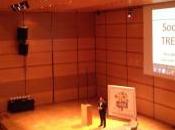In primo luogo abbiamo chiesto a Stefano se in Italia sia possibile fare seriamente open source, oppure se bisognerà sempre cedere davanti alle resistenze delle aziende: a suo avviso già ora si "fa open source" seriamente in Italia, la domanda è se effettivamente le imprese siano in grado di recepire le offerte. Come in molti altri casi, si tratta di un fatto culturale, e in Italia siamo indietro su tutte le questioni culturali che riguardano le tecnologie. Sarebbe interessante affidare alla RAI il ruolo di diffondere queste pratiche, come già anticipato da Mario Monti.
Inoltre abbiamo chiesto se sia giusto pagare il canone aggiuntivo che grava su privati e professionisti che utilizzano l'ADSL: storicamente la remunerazione della rete dell'operatore monopolista - ma non solo - era basata sul traffico voce. I prezzi prevedevano dunque che una parte del costo della linea dati venisse coperta dalla parte voce, motivo per cui si è resa necessaria una maggiorazione.
 Stefano è d'accordo sul fatto che non si possa imporre a Telecom l'esproprio e lo scorporo della rete fisica, anche perché le leggi non lo consentono. Va fatto un percorso che riesca a far combaciare gli interessi di tutti gli operatori.
Stefano è d'accordo sul fatto che non si possa imporre a Telecom l'esproprio e lo scorporo della rete fisica, anche perché le leggi non lo consentono. Va fatto un percorso che riesca a far combaciare gli interessi di tutti gli operatori.Per quanto riguarda l'alfabetizzazione digitale con l'uso di volontari, si tratta di un'operazione complessa: ci sono state delle buone pratiche in Veneto, che aiutano a superare il digital divide culturale, ma ci sono altre regioni in cui non ha funzionato. Intervenire dunque in modo diretto no, ma sicuramente sarebbe interessante stimolare il ruolo del "terzo settore" - in senso lato - che intervenga a supporto di questo genere di iniziative.
Spesso si parla del fatto che il divario digitale sia in realtà inferiore a quello percepito: questo avviene secondo Stefano perché i dati usati sono quelli sulla copertura dell'ADSL e della fibra ottica, ma ci sono tanti privati che forniscono copertura wireless che sfugge ai censimenti, e che operano perlopiù nelle zone che in teoria sarebbero digital divise.
Abbiamo chiesto a Stefano come mai abbia deciso di candidarsi: in verità non si è candidato, ma ha ricevuto un'offerta per la sua disponibilità. Non aveva precedentemente fatto alcun passo in questa direzione, e non era nemmeno tra i suoi piani per il futuro. Ha accettato perché c'era la possibilità di farlo in una situazione dove non c'era una connotazione politica precedente: che ci siano delle alleanze è una conseguenza diretta di questa legge elettorale.
Come ha spiegato anche il Presidente Monti, il meccanismo delle regole parlamentari associato al prodotto della legge elettorale rende impossibile fare delle riforme quando i gruppi devono accontentare le ali estreme: in poche parole, il bipolarismo sta frenando la modernizzazione nel nostro paese.
Vi invito a visionare l'intervista integrale, molto più ricca di dettagli rispetto a questa mia breve sintesi.
Maria Petrescu | @sednonsatiata
Intervistato.com | Stefano Quintarelli
First of all we asked Stefano whether it is possible to do open source for real in Italy, or whether it will always be necessary to give in to the resistance of companies: he believes that we already "do open source for real" in Italy, the question is whether companes are capable of receiving the offers. As in many other cases, it's about the cultural aspect, and in Italy we're far behind on all the cultural matters which regard new technologies. It would be interesting to give to RAI the task of spreading these practices, as Mario Monti has already anticipated.
As for the use of Twitter by mainstream journalists, Stefano thinks that it's just a trend, an imitation of what's being done in the US: some have understood the medium and make good use of it, others simply are carried along.
We asked Massimo how he explains the wave of Italian journalists on Twitter, considering these facts, and he interprets with as he did with blogs and mainstream newspapers in the past. It's basically a trend, and an overestimated one: who already has space on old media, only uses it as an additional tool that sometimes is used in the right way, others not.
We also talked about the integration of social media, traditional journalism and blogs, that in Massimo's opinion represent a single matter. Journalism has changed rapidly together with the growth of the web, which is way it is now crucial to integrate the traditional activity with the filter activity, and not just produce content, since there's so much of it out there.
There are many interesting people who write online and that don't have the journalist card, but that are in every way a resource: the information world becomes wider, not filtered by the journalistic system anymore, and therefore richer.
We asked Massimo what his media diet is and what his definition of journalism is, since he doesn't believe it belongs just to journalists anymore, but it belongs to anyone who wants to be a filter between the public opinion and the news.
We also talked about Eraclito and the evolution of corporate communication, especially about social media use for businesses, about the Cluetrain Manifesto and some predictions for the future of these tools.
I invite everyone to view the full interview, much richer in details and insights than my brief synthesis.
Enjoy!
Maria Petrescu | @sednonsatiata




